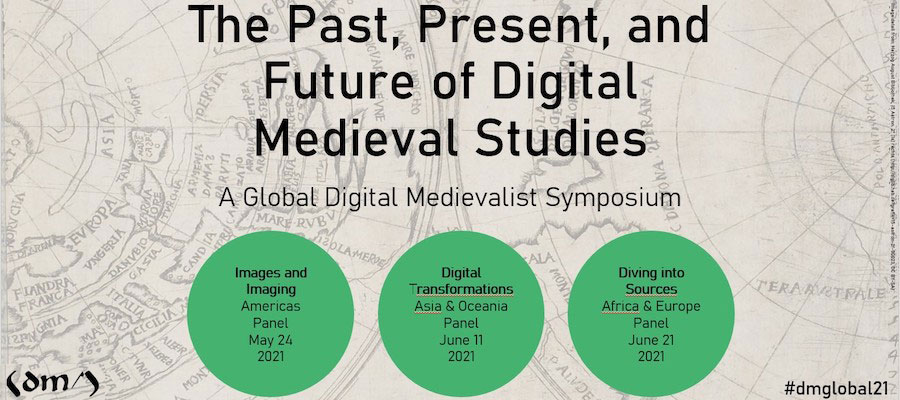The Past, Present, and Future of Digital Medieval Studies – A Global Digital Medievalist Symposium (The Americas), Zoom, May 24, 2021 (11:00 am–3:30 pm EDT), June, 11, 2021 (10:30 pm–4:30 am EDT), June 21, 2021 (7:00–11:30 am EDT)
The era of COVID-19 has been transformational for medieval digital humanities. Medievalists have come to learn the limits and possibilities of online scholarship, whether in the virtual classroom or in the transfer of knowledge among specialists. Although direct access to material sources and the easy face-to-face exchanges with colleagues are deeply missed, we have come to understand that digitally-inflected scholarship can be more economical, more global, and –in limited ways– more equitable for many medievalists. And because we have come to this inflection point, members of the Digital Medievalist Board are launching a conference series that marks this turn and aims to build upon what we have learned. Our theme, The Past, Present and Future of Medieval Digital Studies is both retrospective and prospective in scope, bringing digital medievalist practitioners into conversation with each other as we step into a new scholarly environment where digital methods take on a new importance.
Our new global awareness has inspired us to plan three conference dates, each of which is aligned with a geographic space and accommodates scholars from three time zones grouped as The Americas, Asia & Oceania, and Europe & Africa. The Americas conversation will take place on Monday, 24 May 2021, Asia & Oceania on Friday, June 11, and Europe & Africa on Monday, June 21.
Americas: Images and Imaging – Monday, May 24, 2021, 11:00 am–3:30 pm EDT
For medievalists working in the Americas, increased access to high-quality images of manuscripts and other medieval resources has changed the way we work, whether we consider ourselves digital humanities scholars or not. The ready availability of these resources has opened new ways of thinking about practices that are fundamental to our field, such as textual editing, image description and analysis, or manuscript collation, for example. Yet the instantaneous access we now have to facsimiles of the materials that were previously so difficult or arduous to view masks the enormous amount of expertise needed to bring these images so effortlessly to our desktops. Librarians, curators, cataloguers and information technologists bring their skills and knowledge to the task of image delivery in ways that remain invisible to most subject-area specialists, but have become critical to the way most medievalists now work.
The goal of this conference is to reflect on how access to images — whether limited or open — has shaped how medievalists in the Americas have worked in the past and the present, as well as how they may do so in the future. Topics may include the following: a discussion of how resource professionals take material objects in a collection and create properly catalogued digital objects; IIIF, scanning, metadata, 3D-imaging, and 3D-printing; the relationship between image and material object and the implications for textual scholarship or pedagogy.
Organized by Nathan Daniels, Lisa Fagin Davis, James Harr III, Aylin Malcolm, and Laura Morreale.
Co-sponsored by the Medieval Academy of America
Advance registration required.
